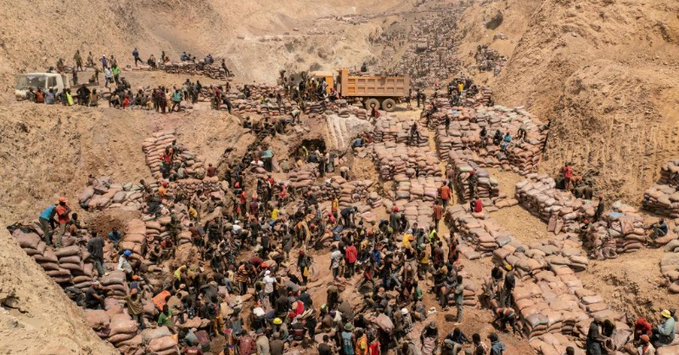The Democratic Republic of the Congo (DRC) boasts an abundance of valuable minerals, making it a global hotspot for resources. With approximately four-fifths of the world’s cobalt reserves, a vital component in electric vehicle batteries and electronics, and over 70% of global cobalt production, as well as holding the seventh-largest copper reserves and ranking third in copper production, the DRC should be poised for economic prosperity, as outlined in its constitution, which grants its citizens the right to share in the nation’s wealth.

However, a darker reality exists for the Congolese people who toil in and around these mines. A significant portion of the industrial mines in the DRC is owned by China, and this ownership has brought forth a slew of issues, including child labour, deplorable working and living conditions, and systematic evictions of local residents residing on vast mining concessions.
A recent report from the Initiative for Good Governance and Human Rights (IBGDH), based in the DRC, in collaboration with Amnesty International, sheds light on how Chinese mining operations in copper and cobalt are negatively impacting lives in the DRC. According to Donat Kambola, the President of IBGDH, individuals are being forcibly displaced, threatened, or coerced into leaving their homes, often with inadequate compensation and no access to justice or grievance mechanisms.
Kolwezi, a focal point of mining expansion in the southern province of Lualaba, has witnessed significant growth in cobalt and copper mining over the past five years, evident through satellite imagery. Mines have encroached upon residential areas, causing entire city streets to vanish.

The IBGDH conducted interviews with over 130 people across six mining projects in Kolwezi, revealing that evictions are frequently carried out without regard for the rights of affected communities or compliance with national laws meant to prevent forced evictions in the mining sector, as stated in their report.
In his book, “Cobalt Red,” Siddharth Kara provides further insights into how the mining industry has devastated the DRC’s landscape. Mines have polluted the air and water with toxic dust and effluents, leading to deforestation on a massive scale. Local miners endure extremely hazardous working conditions, with cobalt’s toxicity posing a constant threat to their health.
China’s ambition to dominate mineral markets is apparent. In 2009, the then-DRC President, Joseph Kabila, signed an agreement with the Chinese government, granting access to mining concessions. Chinese companies swiftly acquired ownership of 15 out of the country’s 19 primary industrial copper-cobalt mining concessions, establishing their dominance not only in excavation but also throughout the supply chain, including refined cobalt and battery production.
President Felix Tshisekedi has pledged to review his predecessor’s deal, which he believes unfairly favours China over the DRC. This disagreement has the potential to strain DRC-China relations, as the Congolese side believes they could have obtained a more favourable arrangement.

President Felix Tshisekedi
In conclusion, the wealth of the DRC’s mineral resources should promise prosperity for its people, but the involvement of Chinese companies in mining has brought significant challenges, including human rights abuses and environmental degradation. Resolving these issues while ensuring fair benefits for the DRC remains a complex task.

